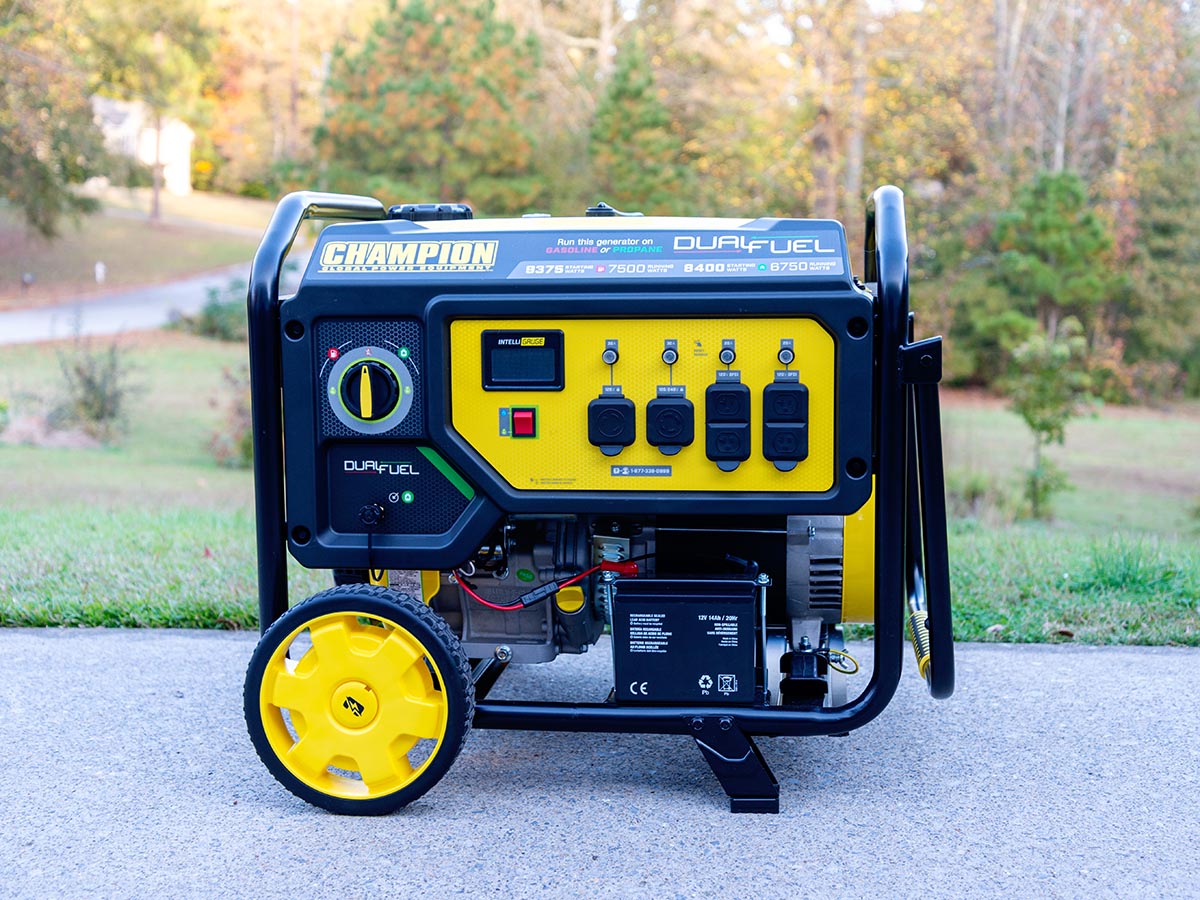

We may earn revenue from the products available on this page and participate in affiliate programs. Learn More ›
Portable generators provide a reliable power source for countless occasions, from remote off-grid worksites to home service during outages. Adding a boost of versatility, dual-fuel portable generators have an advantage over other types because they run on either gasoline or propane—whichever is cheaper or more readily available. Since 2003, California-based Champion Power Equipment has grown to be a trusted manufacturer of home standby generators, inverter generators, and portable generators, including dual-fuel models, with more than 4.5 million units sold in North America alone.
The Champion Power Equipment 100891 7,500-watt dual-fuel generator stands out as a strong midsize portable generator. I tested it for a month, during which it powered my RV, several backyard construction projects, and served as an emergency home backup. The available electricity was more than enough for every occasion. However, it will not be the ideal choice for every shopper. In this review, I will share my observations from testing, why I think the Champion dual-fuel generator could be a great pick, and why some shoppers may want to continue looking for a more suitable option.
Champion Power Equipment 100891 7500-Watt Dual-Fuel Generator: At a Glance
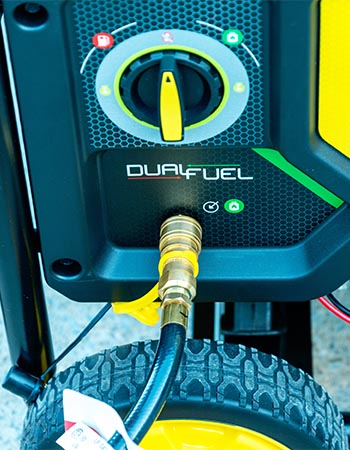
Rating: 9.6/10
SPECS
- Fuel types: gasoline or propane
- Engine displacement: 439 cubic centimeters (cc)
- Gasoline tank volume: 7.7 gallons
- Gasoline wattage: 9,375 (starting); 7,500 (running)
- Gasoline runtime: 10 hours per tank at 50 percent load
- Propane wattage: 8,400 (starting); 6,750 (running)
- Propane runtime: 5.5 hours per 20-pound tank at 50 percent load
- Outlets: (4) GFCI 5-20R, (1) L14-30R, (1) L5-30R
- Dimensions: 26.1 inches high by 28.9 inches long by 27.7 inches wide
- Weight: 205 pounds
- Noise level: 74 decibels A (dBA)
- Environmental: U.S. Environmental Protection Agency certified, California Air Resources Board compliant
PROS
- Runs for 10 hours per tank of gas or 5.5 hours per tank of propane
- Offers numerous power options, including a 30-amp outlet for home backup
- Easy keyless electric starting at the push of a button
- Intelligauge display shows power output and maintenance intervals in real time
- Foldaway U-shaped handle and flat free wheels simplify transport
CONS
- Fuel consumption is higher per watt produced than the most efficient portable generators
- Heavy and difficult to maneuver on unpaved ground
- Sound level is louder than a vacuum cleaner; may not be suitable for some applications
Get the Champion Power Equipment 7,500-watt dual-fuel generator at:
What is the Champion Power Equipment 7,500-watt dual-fuel generator?
The Champion Power Equipment 100891 7,500-watt dual-fuel generator combines versatility with convenience for a variety of off-grid power needs. Fueled by either gasoline or propane, it produces enough electricity to supply the home during an electrical outage or to power up a remote construction project. This generator comes equipped with an electric start system that is specifically engineered for easy and reliable starting in cold weather.
The generator arrives ready to use after assembling the wheels and stationary feet, connecting the battery cable, and adding the included 1.2 quarts of 10W-30 motor oil. A patented fuel-selector switch makes choosing the fuel source quick and easy. The engine is equipped with a manual choke lever and both an electrical start switch and a recoil starter cord just in case the battery dies. While in operation, the generator registers 74 dBA from 23 feet away, which is a bit louder than a vacuum cleaner. To monitor power output and maintenance intervals, the display screen shows the actual voltage, hertz, and accumulated runtime. For optimal performance and protection, the unit includes a low oil shut-off sensor, protection against voltage spikes, and a grounding terminal that can be attached to a copper wire and ground stake (sold separately).
The 439cc Champion engine is the heart of this generator. Running on gasoline, it produces 9,375 starting watts and 7,500 running watts. With an electrical load of 50 percent capacity, the 7.7-gallon gas tank provides 10 hours of continuous running time. Fueled by propane, it produces 8,400 starting watts and 6,750 running watts. It runs for 5.5 hours at 50 percent capacity on a 20-pound propane tank. The included 6-foot propane hose features a built-in regulator and heavy-duty brass quick connector on the generator end.
The Champion dual-fuel generator offers plenty of outlets to satisfy different needs. Four ground-fault circuit interrupter (GFCI)–protected (5-20R) household outlets can directly power most corded tools and household appliances. The (L5-30R) 120-volt 30-amp outlet offers flexibility for a variety of applications, such as supplying power to an RV or extending power further from the generator via a heavy-duty convenience extension cord. The 120/240-volt (L14-30R) locking outlet allows the generator to work as an emergency home backup generator, if the home electrical system is properly equipped, or it can supply heavy-draw tools such as a portable welder.
Over the course of a month, I used this generator to power my 17-foot travel trailer on an overnighter, a remote building project site, and my home during a power outage. In every case, it started immediately and delivered plenty of electricity all day long. Read on for more details.
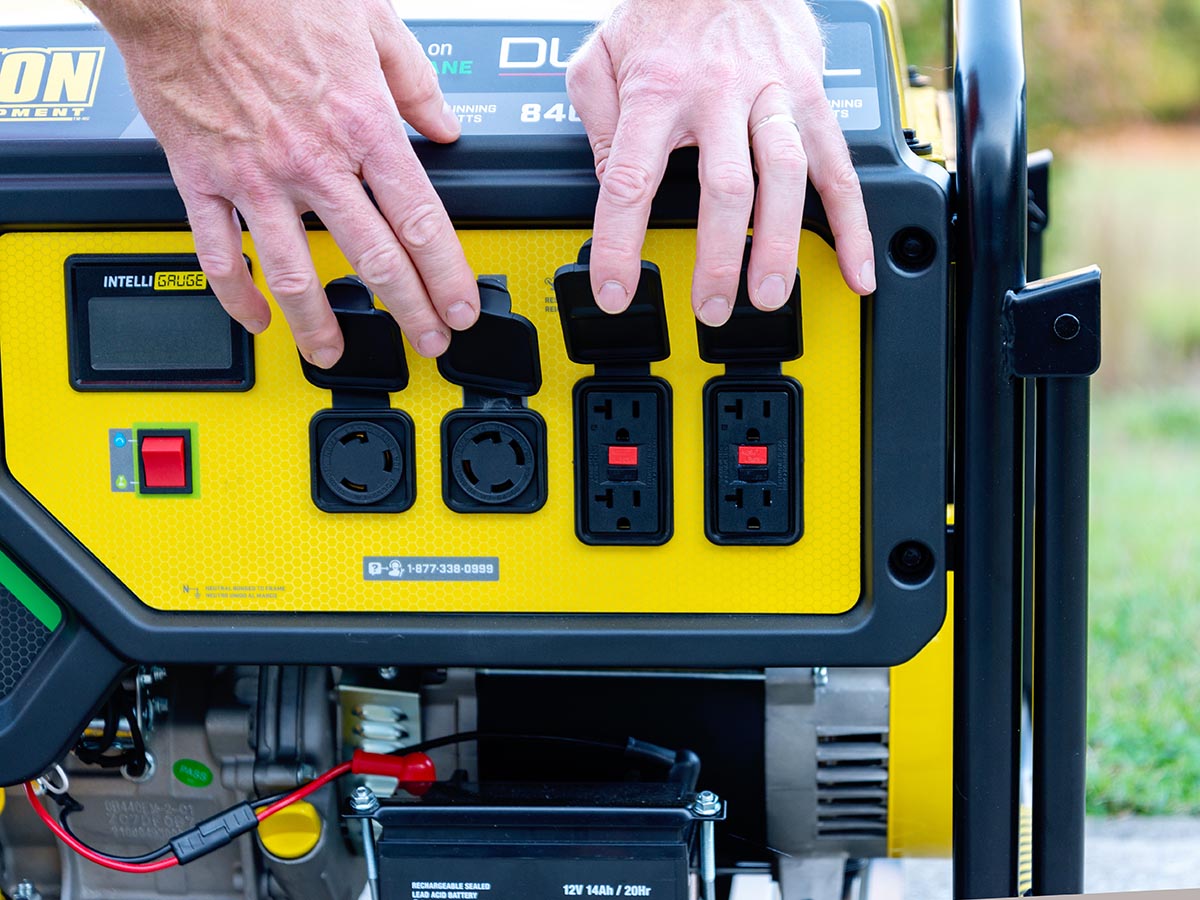
Heavy and Loud, but Dependable and Easy to Use
Assembling the Champion 7,500-watt dual-fuel generator took about 20 minutes, including unboxing, attaching the wheels and feet, connecting the battery, and adding the oil. Had it not weighed more than 200 pounds, it may have only taken half of that time. I used the preinstalled handle to raise one end of the generator and slid blocks beneath the frame to hold it off the ground so I could attach the wheels and feet, then removed the blocks. After assembly, it requires a 5-hour break-in period to condition the engine, so I followed those instructions before proceeding.
For the first test, while the generator was still in my driveway, I attached a propane tank and turned the fuel knob to “propane.” I set the choke, pressed the start button, and it came on in less than 2 seconds. Then I used an adapter to plug my (TT-30P) RV power cord into the L5-30R outlet and turned on the appliances in the RV. Although the noise level was higher than would be permissible in many campgrounds, the Champion 7,500-watt dual-fuel generator powered the refrigerator, air conditioner, microwave, and an electric grill (plugged into the outlet on the outside of the RV) for a couple of hours with no dropoff in performance. After the test, I took it out to the woods for an overnight trip. Due to the loud noise, I only used the generator during the highest usage times of meal preparation and cleanup. This was not a great use for the generator.
For the second test, I pulled the generator 400 feet, around my house, through a gate, to the back of my property in order to run power tools for a small construction project. Getting the generator to the worksite was the hardest part. The fold-down transport handle made it easier to move the 205-pound machine, but it still took 57 pounds of lifting force just to lift and hold the generator with its feet off the ground for transport. (I measured the lifting force with a 110-pound mechanical scale.) Terrain and soft ground added to the effort. The hard plastic wheels will never go flat, but they are not ideal for off-pavement travel. During the 8.5 hours while we worked, the generator had no trouble keeping up with the table saw, miter saw, and air compressor, all in use at the same time.
I used gasoline for the construction project, partly because I didn’t want to carry bulky propane tanks to the back of the yard, partly because of the longer runtime per tank, and also because of the cost. For extended use, fuel costs could make a big difference. At current prices in my area, one tank of gasoline (7.7 gallons) cost $25.03 and gave a similar runtime to two 20-pound propane tanks. Propane refills in my area cost about $13.99 per 20-pound tank, while tank exchanges cost between $19.99 and $24.99. But as standby fuel in storage, propane does not degrade like gasoline, which can go bad after just 3 to 6 months. There are lots of variables to consider, and this generator accommodates different options.
Ideal for Power Tools and Power Outages
While the Champion 7,500-watt dual-fuel generator can handle many different uses, there are some jobs for which it is best suited. It offers ample power and lots of outlets that could power an endless assortment of tools and appliances. Two key considerations are the generator’s overall size and weight and its noise level. This unit takes up about half as much storage space as a lawn tractor and weighs over 200 pounds. For that reason it is best suited for applications with plenty of storage capacity, and where it will be used fairly close to truck access (to minimize hand transport). At 74 dBA, it’s too noisy to operate in campgrounds and other noise-sensitive settings.
During a power outage, the Champion 7,500-watt dual-fuel generator could run the most critical circuits until the power comes back on. Appliances like refrigerators and air conditioners require a strong surge of energy to start running, and once running, the power consumption levels off at a lower rate. Fueled by gasoline, this generator delivers 7,500 running watts and 9,375 surge watts, also called starting watts. As a backup generator, it could run a refrigerator/freezer, deep freezer, well pump, and water heater. Another possible combination might include a central air conditioning or furnace fan system, refrigerator/freezer, and a few light fixtures.
In a shop setting or on a building site like mine, this generator supports the simultaneous operation of multiple high-draw tools such as a portable table saw, miter saw, router, and pancake air compressor, with power to spare for smaller devices like battery chargers. The four GFCI-protected 5-20R outlets can be used to operate tools and battery chargers, while the L5-30R supports the use of a convenience extension cord for additional tool capacity. It’s a good option to keep a whole crew working, but for just one or two workers, it is less efficient since the extra electricity is lost.
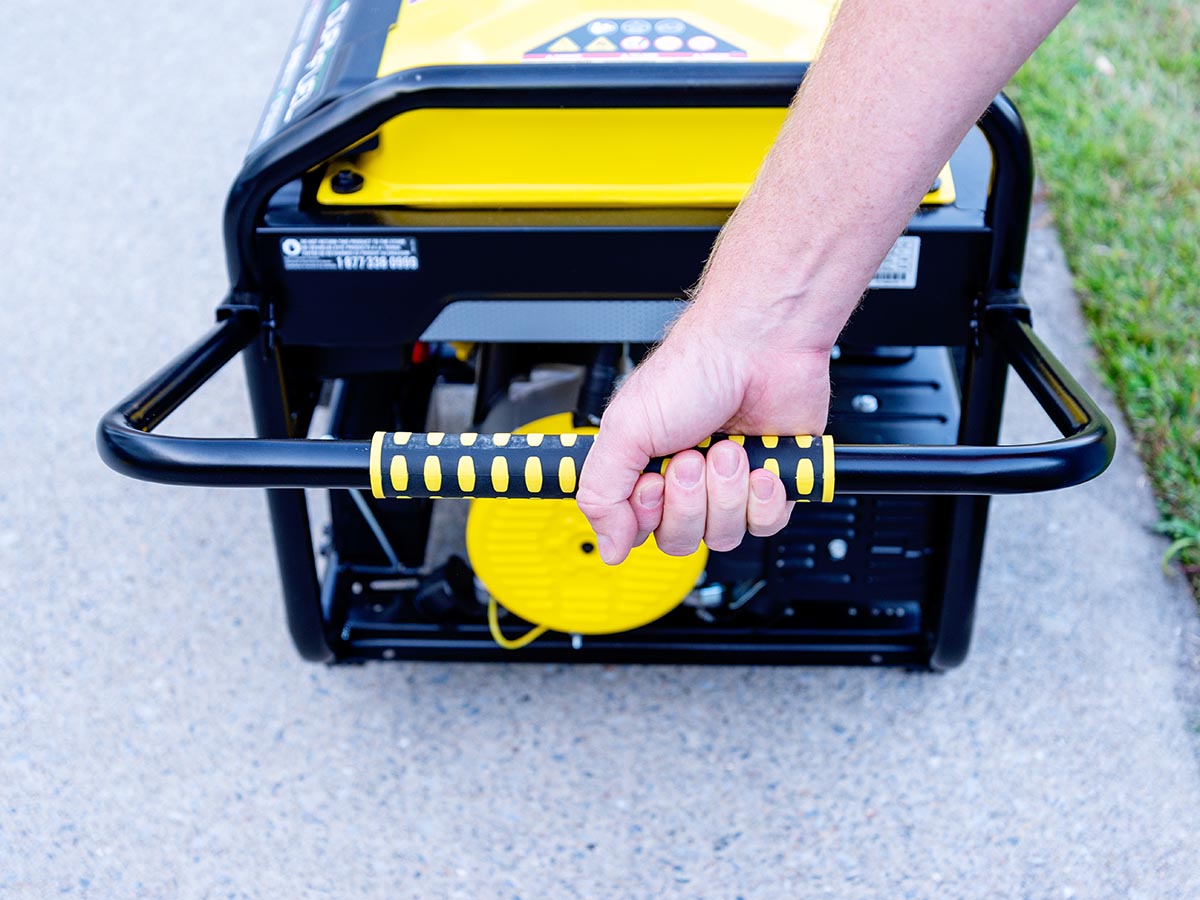
Effective Home Backup Generator
The safest, most convenient way to use a portable generator for backup electricity is through a professionally installed transfer switch connected to the electrical service panel. This setup isolates critical circuits from the power grid and connects them to generator power in a matter of seconds. The L14-30R outlet on the Champion 7,500-watt dual-fuel generator is the ideal connection point for this application because it can deliver either 120 or 240 volts and up to 7,200 running watts. It would not be enough electricity to run the whole house but provides adequate capacity for some lighting, key appliances, and an extra outlet or two.
Even though my home is not equipped with a transfer switch, the Champion generator still proved very helpful during a 4-hour storm outage. I used heavy-duty extension cords to extend power directly to my refrigerator, deep freezer, two space heaters, and a surge protector power strip for charging phones and other electronic devices. Doing it this way took more time, and routing the extension cords required some creative problem-solving skills, but it was absolutely worth the effort. It was a big relief to have at least some electricity when the rest of the neighborhood was dark. The combination of affordability and adaptability makes this a good “starter generator” for those who want to become better prepared for outages.
Too Loud for Camping
While some users may find the Champion 7,500-watt dual-fuel generator useful for their cabin or for boondocking, its size, weight, and noise make it less than ideal for conventional RV camping. It was too bulky and heavy for me to lift into the truck by myself, and my travel trailer does not have a large enough trailer tray to accommodate it. Also, since most campgrounds limit generator noise to 60 dBA, I couldn’t have used it anyway.
Is the Champion 7,500-Watt dual-fuel generator worth the money?
Power generation is the most important factor when shopping for a generator, but not all product listings are what they might appear to be. As noted above, it is important to differentiate between running wattage and starting wattage. Champion generators are named according to running wattage, while other brands may show the starting wattage in product names. For instance, the Sportsman 7,500/6,000 generator offers 1,500 fewer running watts than this Champion model and costs noticeably less.
When it comes to performance, the Generac GP7500E dual-fuel generator is a more comparable option. Like the Champion model, it offers 7,500 running watts; 9,375 starting watts; and a similar assortment of electrical outlets. The dimensions and weight are nearly identical as well. The Champion generator sells for about $1,000, while the Generac model is listed for $1,119. For basic power production, the Champion 7,500-watt dual fuel generator is worth the money.
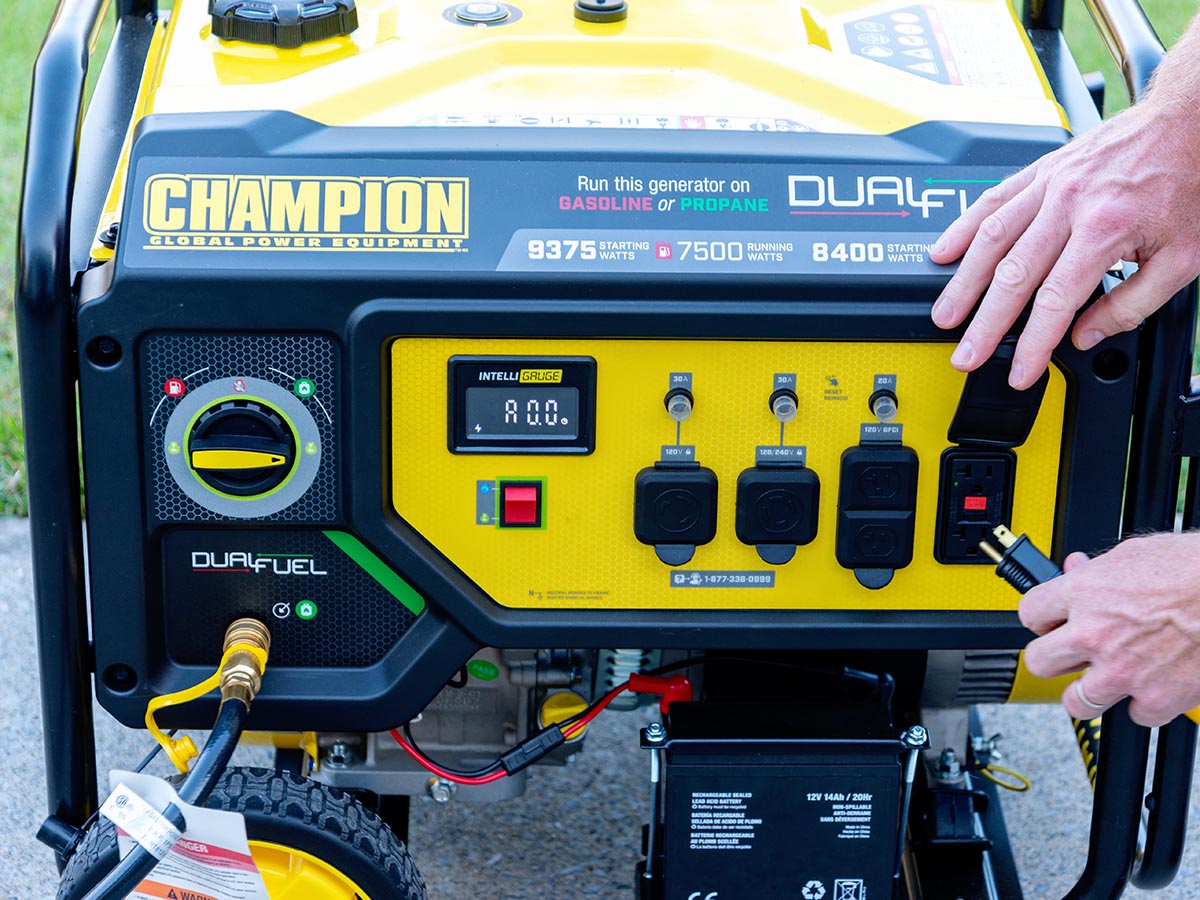
Is Champion Power Equipment 7,500-watt dual-fuel generator right for you?
Whether it’s a matter of preparation for power outages or having a portable source of electricity for various projects and events, a portable generator can be an excellent investment. As a matter of convenience, dual-fuel capability allows users to choose the best alternative for any given situation. For the best results, it’s important to choose a generator that is easy to operate and that can supply the right amount of power. Low power production leaves users lacking, and excessive power production reduces efficiency. For some applications, the sound level and ease of transport are equally important.
At about $1,000, the Champion Power Equipment 7,500-watt dual-fuel generator is a good value. It comes equipped with numerous outlets for a wide variety of uses and provides enough power to run household basics during a power outage. The assortment of outlets makes it equally functional for homes that are wired for backup power and those that are not. It’s also a good choice for remote worksites where high-draw tools need a reliable power source. In my experience, the biggest weak point of this generator was maneuverability over non-paved ground, but it was not enough to be a deal-breaker. If you need a versatile generator for home or workshop applications, this one is a good choice.
Where to Buy the Champion Power Equipment 7,500-Watt Dual-Fuel Generator
Get the Champion Power Equipment 7,500-watt dual-fuel generator at:
Meet the Tester
Mark Wolfe is a writer and product tester with an extensive background in the nursery and landscaping industries. For more than 20 years he mowed, edged, planted, pruned, cultivated, irrigated, and renovated beautiful landscapes. Now he tests and writes reviews about the latest outdoor power equipment, hand tools, lawn care products, and other outdoor living goods.
